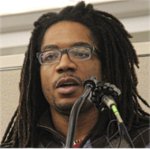Fighting for people’s power
Talk given at the 2013 WWP conference by Larry Hales.
What drives us as revolutionaries is our ability to generalize from our individual hardships — to see them not as personal misfortunes, but as stemming from systemic exploitation and oppression in an uncaring system, one that puts the interests of the few over the many, that would let the world burn to benefit the few.
It is the oppressed world that the capitalists superexploit, and they make superprofits from extracting resources there. The oppressed suffer the worst in Asia, Africa, Latin America and the Caribbean. They suffer the brunt of the devastating consequences of a degraded environment.
We see the symptoms every day on the faces of working and oppressed people, the families who struggle to make ends meet, those affected by the $5 billion food stamp program cut. Any day, more cuts could leave families with less than the current $1.50 per person per meal.
Every day, we see homelessness, crumbling infrastructure, lack of access to education — and national oppression. The capitalist government and bourgeois politicians threaten more cuts, a permanent austerity. It’s a war against the workers at the behest of a class of superwealthy bosses and bankers so they can keep robbing treasuries at every level.
This more aggressive attack comes after the financial markets’ near collapse a few years ago, and the so-called recovery, which reveals the nature of the capitalist crisis.
The system is at a dead end; the normal cycle of capitalism cannot start up again. The normal means have been exhausted because of overcapacity. Nothing short of a devastating world war can bring the capitalist system out of its crisis.
The consciousness of working and oppressed people has yet to catch up to the objective reality. Comrade Larry Holmes, WWP’s first secretary, discussed the political crisis facing workers and the oppressed, a crisis of leadership and organization that presents a clear picture of society’s fundamental problem. Income inequality is great and it’s growing. The rich and the corporations could pay more taxes. The minimum wage has not kept up with inflation and must be raised so that workers can survive without working themselves to death.
We should fight for every gain. It is crucial to blame the capitalist system for all of these symptoms. Every gain is fleeting, while the system is left standing, and the capitalist class is not in a mood to make concessions.
Building a broad, anti-capitalist struggle
How do we build a broad struggle that is anti-capitalist at its core? A struggle that develops the fighting skills of working and oppressed people, builds confidence and takes root at a cellular level — in the neighborhoods, on the blocks. One that struggles against racist state repression, fights austerity and budget cuts. It must fight for basics like utilities and food, the right to housing, and oppose evictions and foreclosures.
Yet, it must be a struggle that doesn’t obscure the national question, the LGBTQ and women’s questions, and one with a deep understanding of solidarity. It must be internationalist and see imperialism — primarily U.S. imperialism — as the primary enemy of the world’s oppressed and working people. These things are key.
The Occupy Wall Street movement was a great, spontaneous rebellion against the capitalist system. While it had its contradictions, a positive aspect is that it highlighted how fraudulent this so-called “democracy” is — that it is a democracy for the rich, a dictatorship by the rich that serves to maintain society’s contradictions. OWS woke up a large sector of youth.
Our perspective of building People’s Power Assemblies, workers’ assemblies, the assembly movement as a vehicle for struggle, is the next logical step from the OWS movement. It gives voice to working and oppressed people, and is a place where people can take grievances and find remedies. We also see it as part of a process to build dual power, to circumvent the existing bourgeois political superstructure and rival it for power until those structures can be swept aside and replaced with people’s power.
We are at an early step, struggling to get the idea out there. We are not the only ones. The Jackson People’s Assembly was instrumental in getting Chokwe Lumumba elected mayor in Jackson, Miss., using a program almost identical to that of the Republic of New Afrika. Similar experiments have been launched by other left organizations and in the oppressed communities. Hopefully, these efforts will merge.
We have had successes with Detroit’s “International Assembly against the Banks,” and in Baltimore, Philadelphia, San Diego and elsewhere. In New York, we are planning a workers’ assembly and a tribunal aimed at uniting various struggles behind programs of demands and action. It will put the system and the state on trial.
It’s part of a necessary process to build a broad classwide fightback to organize resistance and maintain a revolutionary perspective to guide us. We are bold, solid and revolutionary to the core.
Borrowing words from Che, we must be guided by “great feelings of revolutionary love” of our class, of the oppressed and “tremble with indignation at every injustice.” All power to the people! Build the People’s Power Assemblies! Build the assembly movement! Let’s build a workers’ world!


